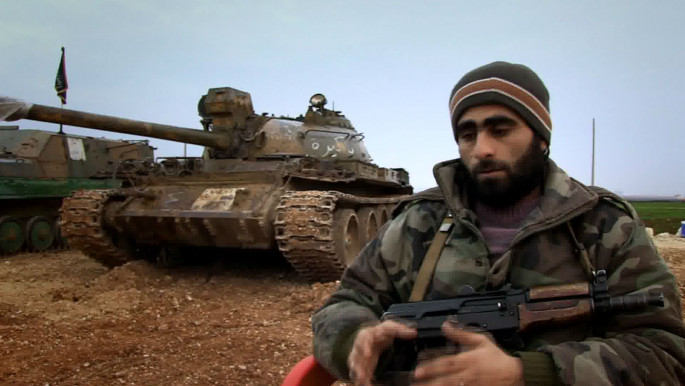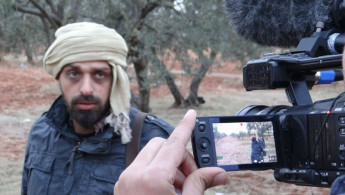Syrian account of war wins prestigious journalism award
Syrian account of war wins prestigious journalism award
Muhammad Ali, a Syrian filmmaker, won the 2015 duPont award for his film, Syria's Second Front.
5 min read
Muhammad Ali sneaked into IS-held territory to film 'Syria's Second Front' [al-Araby]
The opening shots of Syria's Second Front, produced by PBS Frontline, show Syrian filmmaker Muhammad Ali using the dark of the night to sneak into his home country. At the border he is met by rebels who escort him to their base.
The secrecy of Ali's entry into Syria is not for the purpose of avoiding Syrian president Bashar al-Assad's forces, but that of a different enemy, the Islamic State group, or, as they were known during filming in December 2013 and January 2014, the Islamic State in Iraq and Sham (ISIS).
That is the focus of Ali's 21-minute film, which premiered on 11 February 2014 - the fight rebel groups under the banner of the Free Syrian Army (FSA) find themselves in against ISIS.
The film's central scenes show Ali, who now works for al-Araby TV, al-Araby al-Jadeed's sister television station, and the rebels sneaking into al-Atareb, an ISIS-controlled town in Syria's northern Idlib province, where Ali captures an ISIS recruitment event packed with children, near a building where several captured rebels had previously been executed by the radical ISIS militants.
"For me the sneaking inside wasn't the hard part," says Ali.
"The hardest part was when I saw children in the square during an ISIS rally. Small children, five or eight... And they were listening to the ideology of ISIS.
"They are the new generation. These guys will grow up with such an ideology. That is the danger of such a group."
On 17 December, Ali's work received one of the most prestigious honours in the broadcast journalism business. Syria's Second Front was a recipient of the 2015 duPont award, given by Columbia University - the broadcast equivalent of the Pulitzer Prize awarded by the same university.
The award committee described the film as "groundbreaking reporting at its most courageous".
"It's one of the biggest awards for investigative work," says Ali. "I feel honoured to be a winner of this award."
It was the shock of seeing his home country descending into destruction that encouraged Ali to face his fears and venture into a warzone to make his documentaries.
"I was scared to cover the war before, the idea of going to a frontline frightened me," says Ali. "But because I saw what was happening in my country that encouraged me to go - because I felt that people needed someone to cover the situation."
Ali has made documentaries for PBS, the BBC, Germany's ZDF and ABC, as well as having his work, from across the Arab world, featured in Foreign Policy and the Washington Post, among others.
However, he wasn't always a war correspondent. Living in Syria until 2009, he was a financial journalist.
The world of shares and stock markets is a far cry from following Hazem, a tough rebel commander, and his band of FSA men as they prepare to fight ISIS.
Ali has to continuously come in and out of ISIS-held territory, and for that he had to make himself inconspicuous. Even his camera had to be smuggled in with traders.
"If you see the film you will see that I changed my look," Ali explains. "I wore a scarf, I wore clothes similar to the locals."
He blended in with Hazem's men, and the film captures the war from their perspective, and the problems the "moderate" rebels face.
Beset by political infighting, the Syrian opposition faces two strong enemies, the Assad regime and ISIS and its affiliated militant Islamist groups. The rebels are pleading for weapons and support, but have not been granted it.
In one shot, a group of Hazem's men are seen pushing along a pick-up truck loaded with a heavy gun to get it started. The ammunition they use is mostly captured from their opponents. Ali says they are now bitter and angry at the lack of support.
"They were promised that the international powers would help them, that they would get more advanced weapons," he says. "But they haven't got that. They are between the regime and ISIS."
Despite their lack of fighting power, the rebels managed to push ISIS out of al-Atareb, after launching an attack on their base in the town.
The children, who were gathered around the ISIS recruiters only weeks before, were now smiling in front of Ali's camera, and residents proclaimed that they were happy ISIS were gone.
"Today ISIS, tomorrow Assad," yells one of the fighters.
By late January, al-Atareb was being shelled by Assad. And ISIS recovered from the rebel attacks to take vast swathes of territory in Iraq and Syria later in 2014, leaving the rebels on the back foot again.
"For me it's not shocking at all," says Ali, when asked whether he's surprised about the re-emergence of ISIS since his film was made.
"ISIS is investing in the new generation. They are looking for the new generation who will obey any order. I think it will be more dangerous in five years or more, they will have a new generation completely under their control."
The secrecy of Ali's entry into Syria is not for the purpose of avoiding Syrian president Bashar al-Assad's forces, but that of a different enemy, the Islamic State group, or, as they were known during filming in December 2013 and January 2014, the Islamic State in Iraq and Sham (ISIS).
That is the focus of Ali's 21-minute film, which premiered on 11 February 2014 - the fight rebel groups under the banner of the Free Syrian Army (FSA) find themselves in against ISIS.
The film's central scenes show Ali, who now works for al-Araby TV, al-Araby al-Jadeed's sister television station, and the rebels sneaking into al-Atareb, an ISIS-controlled town in Syria's northern Idlib province, where Ali captures an ISIS recruitment event packed with children, near a building where several captured rebels had previously been executed by the radical ISIS militants.
"For me the sneaking inside wasn't the hard part," says Ali.
"The hardest part was when I saw children in the square during an ISIS rally. Small children, five or eight... And they were listening to the ideology of ISIS.
"They are the new generation. These guys will grow up with such an ideology. That is the danger of such a group."
On 17 December, Ali's work received one of the most prestigious honours in the broadcast journalism business. Syria's Second Front was a recipient of the 2015 duPont award, given by Columbia University - the broadcast equivalent of the Pulitzer Prize awarded by the same university.
The award committee described the film as "groundbreaking reporting at its most courageous".
| They are the new generation. These guys will grow up with such an ideology. - Muhammad Ali, filmmaker, on ISIS child recruits |
It was the shock of seeing his home country descending into destruction that encouraged Ali to face his fears and venture into a warzone to make his documentaries.
"I was scared to cover the war before, the idea of going to a frontline frightened me," says Ali. "But because I saw what was happening in my country that encouraged me to go - because I felt that people needed someone to cover the situation."
Ali has made documentaries for PBS, the BBC, Germany's ZDF and ABC, as well as having his work, from across the Arab world, featured in Foreign Policy and the Washington Post, among others.
 |
|
| Hazem is the commander of an FSA brigade [still from film] |
However, he wasn't always a war correspondent. Living in Syria until 2009, he was a financial journalist.
The world of shares and stock markets is a far cry from following Hazem, a tough rebel commander, and his band of FSA men as they prepare to fight ISIS.
Ali has to continuously come in and out of ISIS-held territory, and for that he had to make himself inconspicuous. Even his camera had to be smuggled in with traders.
"If you see the film you will see that I changed my look," Ali explains. "I wore a scarf, I wore clothes similar to the locals."
He blended in with Hazem's men, and the film captures the war from their perspective, and the problems the "moderate" rebels face.
Beset by political infighting, the Syrian opposition faces two strong enemies, the Assad regime and ISIS and its affiliated militant Islamist groups. The rebels are pleading for weapons and support, but have not been granted it.
In one shot, a group of Hazem's men are seen pushing along a pick-up truck loaded with a heavy gun to get it started. The ammunition they use is mostly captured from their opponents. Ali says they are now bitter and angry at the lack of support.
"They were promised that the international powers would help them, that they would get more advanced weapons," he says. "But they haven't got that. They are between the regime and ISIS."
Despite their lack of fighting power, the rebels managed to push ISIS out of al-Atareb, after launching an attack on their base in the town.
| Because I saw what was happening in my country that encouraged me to go because I felt that people needed someone to cover the situation. |
The children, who were gathered around the ISIS recruiters only weeks before, were now smiling in front of Ali's camera, and residents proclaimed that they were happy ISIS were gone.
"Today ISIS, tomorrow Assad," yells one of the fighters.
By late January, al-Atareb was being shelled by Assad. And ISIS recovered from the rebel attacks to take vast swathes of territory in Iraq and Syria later in 2014, leaving the rebels on the back foot again.
"For me it's not shocking at all," says Ali, when asked whether he's surprised about the re-emergence of ISIS since his film was made.
"ISIS is investing in the new generation. They are looking for the new generation who will obey any order. I think it will be more dangerous in five years or more, they will have a new generation completely under their control."



